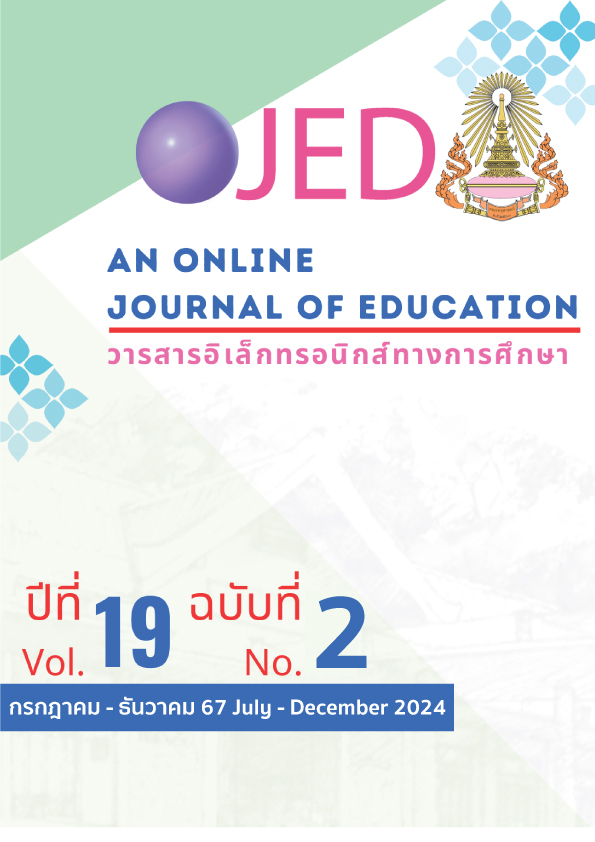Instructional Guidelines for Promoting Geo-literacy of Upper Secondary School Students
DOI:
https://doi.org/10.14456/ojed.2024.4Keywords:
geo-literacy, instructional guidelines, problems and condition instructionalAbstract
The purposes of this descriptive research were: 1) to study the existing conditions and problems, and 2) to propose instructional guidelines for promoting geo-literacy among upper secondary school students. Data were collected by using surveys and qualitative interviews with a sample group, consisting of 312 high school social studies teachers. From this group, there were 10 teachers who specialized in teaching geography. The research tools included a questionnaire and interview form, and data were analyzed using descriptive statistics percentages, arithmetic average standard deviation and content analysis. This study found that, in terms of teacher preparation, teachers lack up-to-date knowledge and skills in teaching geography and lack continuous support for knowledge and skill development. In terms of learning objectives, teachers lack an understanding of the components of geo-literacy, resulting in a failure to link learning objectives with geo-literacy components. In terms of teaching activities, Teaching lacks variety and interest, and there is a lack of technology use in teaching activities. In terms of media and learning resources, Teachers still lack modern media and learning resources. There is also inconvenience in using media and a lack of facilities that support the use of geographical media and learning resources. In terms of assessment and evaluation, there is a lack of effective assessment methods and tools. The proposed instructional guidelines for promoting geo-literacy are: Teachers should develop their knowledge and skills in teaching geography through workshops and continuous learning. Teachers must clearly define learning objectives that cover the components of geo-literacy. They should organize teaching activities using geospatial technology and hands-on practice, employ the geo-inquiry process and fieldwork. Teachers should use media and learning resources that utilize geospatial technology. They should design assessments that link with the components of geo-literacy and use authentic assessment methods with scoring rubrics.
References
ภาษาไทย
กนก จันทรา. (2561). การรู้เรื่องภูมิศาสตร์ : ถอดบทเรียนประสบการณ์การจัดการเรียนรู้ภูมิศาสตร์ในชั้นเรียนที่เสริมสร้างการรู้เรื่องภูมิศาสตร์. โรงพิมพ์แห่งจุฬาลงกรณ์มหาวิทยาลัย.
กระทรวงศึกษาธิการ. (2560). ตัวชี้วัดและสาระการเรียนรู้แกนกลางสาระภูมิศาสตร์ (ฉบับปรับปรุง พ.ศ. 2560) กลุ่มสาระการเรียนรู้สังคมศึกษา ศาสนา และวัฒนธรรม ตามหลักสูตรแกนกลางการศึกษาขั้นพื้นฐาน พุทธศักราช 2551 และแนวการจัดกิจกรรมการเรียนรู้. http://academic.obec.go.th/images/document/1580786546_d_1.pdf
คณัฏพัส บุตรแสน. (2561). การศึกษาผลการเรียนรู้และความสามารถทางภูมิศาสตร์ เรื่อง เรียนรู้ ร่วมคิด แก้วิกฤตสิ่งแวดล้อมของนักเรียนชั้นมัธยมศึกษาปีที่ 5 โดยการจัดการเรียนรู้ด้วยกระบวนการทางภูมิศาสตร์. [วิทยานิพนธ์ปริญญามหาบัณฑิต, มหาวิทยาลัยศิลปากร]. Silpakorn University Repository: SURE. https://sure.su.ac.th/xmlui/handle/123456789/24046
คำคิด บุตรปาละ. (2544). สภาพและปัญหาการจัดการเรียนการสอนเนื้อหาวิชาภูมิศาสตร์ในหลักสูตรสังคมศึกษา ระดับชั้นมัธยมศึกษาตอนต้น สังกัดกรมสามัญศึกษา และโรงเรียนขยายโอกาสทางการศึกษา สังกัดสำนักงานการประถมศึกษา ในจังหวัดเลย. [วิทยานิพนธ์ปริญญามหาบัณฑิต ไม่ได้ตีพิมพ์]. มหาวิทยาลัยขอนแก่น.
เฌอณรินทร์ วรรณรัตนางกูร (2562). การพัฒนาการรู้เรื่องภูมิศาสตร์ในการเรียนภูมิศาสตร์ทวีปเอเชียของนักเรียนชั้นมัธยมศึกษาปีที่ 1 ด้วยกระบวนการทางภูมิศาสตร์ร่วมกับเทคโนโลยีสารสนเทศภูมิศาสตร์. [วิทยานิพนธ์ปริญญามหาบัณฑิต, มหาวิทยาลัยศิลปากร]. Silpakorn University Repository: SURE. https://sure.su.ac.th/xmlui/handle/123456789/24914
ทัศน์ทอง เข็มกลัด. (2561). การศึกษาพัฒนาการของหลักสูตรภูมิศาสตร์ระดับมัธยมศึกษา. [วิทยานิพนธ์ปริญญามหาบัณฑิต, จุฬาลงกรณ์มหาวิทยาลัย]. Chulalongkorn University Theses and Dissertations (Chula ETD). https://digital.car.chula.ac.th/chulaetd/3582/
ธีรพงศ์ บริรักษ์. (2562). ถอดบทเรียนวิกฤต PM 2.5. EAU Heritage Journal Science and Technology, 13(3), 44-58. https://he01.tci-thaijo.org/index.php/EAUHJSci/article/view/231508/157720
ปวีณา ทาระ. (2559). การศึกษาการจัดการเรียนรู้สังคมศึกษาในสาระภูมิศาสตร์เพื่อพัฒนาการคิดวิเคราะห์ตามทัศนะครูระดับมัธยมศึกษา [วิทยานิพนธ์ปริญญามหาบัณฑิต, มหาวิทยาลัยศรีนครินทรวิโรฒ]. Central library Srinakharinwirot University. http://thesis.swu.ac.th/swuthesis/Ed_SLM/Paweena_T.pdf
ปิยะบุตร ถิ่นถา. (2560). การจัดการเรียนรู้วิชาภูมิศาสตร์โดยใช้วิธีการแบบเปิดเพื่อพัฒนาทักษะการคิดแก้ปัญหาของผู้เรียนชั้นมัธยมศึกษาปีที่ 4 โรงเรียนสาธิตเทศบาล บ้านเชตวัน. Veridian E-Journal, Silpakorn University (Humanities, Social Sciences and arts), 10(3), 819-835. https://he02.tci-thaijo.org/index.php/Veridian-E-Journal/article/view/104539/83457
พงษ์อินทร์ รักอริยะธรรม. (2559). ปัญหาและการพัฒนาการเรียนการสอนวิชาภูมิศาสตร์เพื่อยกระดับคุณภาพการศึกษาและขีดความสามารถในการแข่งขันของประเทศ. วารสารภูมิศาสตร์ สมาคมภูมิศาสตร์แห่งประเทศไทย, 41(2), 1-19.
เยาวลักษณ์ พลอยแดง. (2540). สภาพ ปัญหาและความต้องการในการจัดการเรียนการสอน สิ่งแวดล้อมศึกษาตามความคิดเห็นของผู้บริหาร และครูในโรงเรียนประถมศึกษา สังกัดสำนักงานคณะกรรมการการประถมศึกษาแห่งชาติ. [วิทยานิพนธ์ปริญญามหาบัณฑิต, จุฬาลงกรณ์มหาวิทยาลัย]. Chulalongkorn University Intellectual Repository (CUIR). http://cuir.car.chula.ac.th/handle/123456789/10766
ศรัณย์ สงนุ้ย. (2563). แนวทางการจัดการเรียนรู้เพื่อเสริมสร้างความฉลาดรู้เรื่องภูมิศาสตร์: บทเรียนจากโรงเรียนที่เข้าแข่งขันภูมิศาสตร์โอลิมปิกระดับชาติ. [วิทยานิพนธ์ปริญญามหาบัณฑิต, มหาวิทยาลัยศรีนครินทรวิโรฒ]. Central library
Srinakharinwirot University. http://irithesis.swu.ac.th/dspace/bitstream/123456789/1322/1/gs611130039.pdf
สำนักงานเลขาธิการสภาการศึกษา. (2560). แผนการศึกษาแห่งชาติ พ.ศ.2560-2579. http://backoffice.onec.go.th/uploaded/Outstand/2017-EdPlan60-79.pdf
สำนักนายกรัฐมนตรี. (2559). แผนพัฒนาเศรษฐกิจและสังคมแห่งชาติ ฉบับที่สิบสอง พ.ศ. 2560 – 2564. https://www.nesdc.go.th/ewt_dl_link.php?nid=6422
อดิศร์ อิศรางกูร ณ อยุธยา. (2559). 5 ปัญหาสิ่งแวดล้อมระดับชาติโจทย์ใหญ่ท้าทายพัฒนา. สถาบันวิจัยเพื่อการพัฒนาประเทศไทย (ทีดีอาร์ไอ). https://tdri.or.th/2016/08/2016-08-14/
อิสรา โต๊ะยีโกบ. (2560). รูปแบบการจัดการเรียนรู้แบบห้องเรียนกลับด้านสำหรับการปฏิบัติการวิธีการทางภูมิศาสตร์ระดับมัธยมศึกษา. วารสารนาคบุตรปริทรรศน์, 9(1). 109-116. https://so04.tci-thaijo.org/index.php/nakboot/article/view/104161/83073
ภาษาอังกฤษ
Backler, A., & Stoltman, J. (1986). The nature of geographic literacy. ERIC Digest, (35), Article ED277601. https://files.eric.ed.gov/fulltext/ED277601.pdf
Edelson, Daniel C. (2014). Geo-Literacy. https://education.nationalgeographic.org/resource/geo-literacy-preparation-far-reaching-decisions/
Hunter, N. (2016). Assessing sense of place and geo-literacy indicators as learning outcomes of an international teacher professional development program (Doctoral dissertation, Portland State University). ProQuest Dissertations and Theses database. https://www.proquest.com/openview/5998473fecf33d1f3639addca9be0c72/
Jambeck, J. R., Geyer, R., Wilcox, C., Siegler, T. R., Perryman, M., Andrady, A., Narayan, R., Law, K. L. (2015). Plastic waste inputs from land into the ocean. Science, 347(6223), 768-771. https://jambeck.engr.uga.edu/wp-content/uploads/2022/02/science.1260352-Jambeck-et-al-2015.pdf
Kerski, J. J. (2015). Geo-awareness, geo‐enablement, geotechnologies, citizen science, and storytelling: Geography on the world stage. Geography Compass, 9(1), 14-26. https://doi.org/10.1111/gec3.12193
Klippel, A., Zhao, J., Oprean, D., Wallgrün, J. O., & Chang, J. S. K. (2019, March). Research framework for immersive virtual field trips. In 2019 IEEE Conference on Virtual Reality and 3D User Interfaces (VR) (pp. 1612-1617). IEEE. https://doi.org/10.1109/VR.2019.8798153
Krejcie, R. V., & Morgan, D. W. (1970). Determining sample size for research activities. Educational and Psychological Measurement, 30(3), 607–610. https://doi.org/10.1177/001316447003000308
Lane, R., & Bourke, T. (2019). Assessment in geography education: A systematic review. International Research in Geographical and Environmental Education, 28(1), 22-36. https://doi.org/10.1080/10382046.2017.1385348
National Geographic Society. (2017). Geo–inquiry process: Educator guide. Retrieved from https://www.nationalgeographic.org/wp-content/uploads/2023/08/Educator_Guide_Geo_Inquiry_Final_2.pdf
Schell, E. M., Mohan, A., The Instructional Materials and Professional Development Committee. (2013). Road map for 21st century geographic education: Instructional materials and professional development. The Geography Teacher, 10(1), 6–14. https://doi.org/10.1080/19338341.2012.758597
Scholte, J. A. (2005). Globalization: A critical introduction (2nd ed.). Palgrave Macmillan.
Tomlinson, J. (1999). Globalization and culture. University of Chicago.
Downloads
Published
How to Cite
Issue
Section
License
Copyright (c) 2024 An Online Journal of Education

This work is licensed under a Creative Commons Attribution-NonCommercial-NoDerivatives 4.0 International License.




